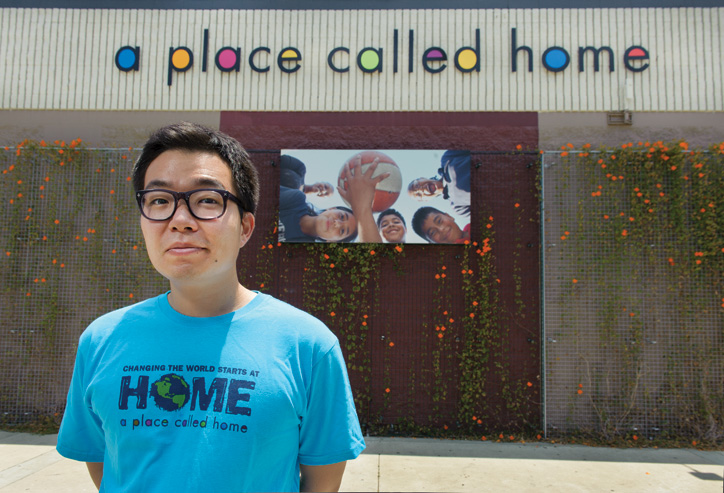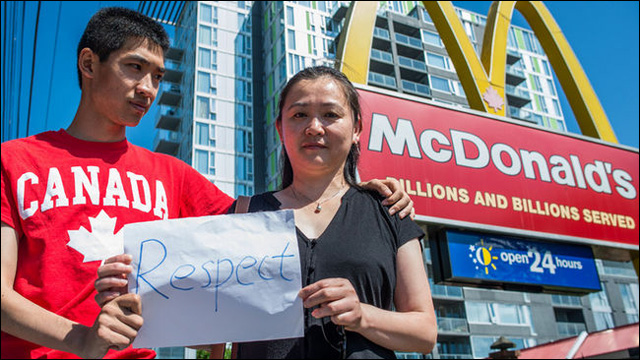At A Place Called Home in South L.A., Charles “Chuck” Kim is helping underserved youth retune their lives through music education.
by CHELSEA HAWKINS
photo by MARK EDWARD HARRIS
During a jam session in the middle of June, about 10 people are crammed into a small recording studio. There are a handful of camera-shy pre-teen girls, who smile nervously, unsure of this reporter and a photographer who have just slipped in. Meanwhile, a well-dressed teen, his hair perfectly coiffed and shoes kicked off, sits behind a keyboard, as a smiling young man, at the far end of the room, strums his electric guitar. A male instructor puts on a voice track, and the musicians starts to jam, playing off each other, altering rhythm and speed, with others in the room throwing out suggestions to change things up or adding in some “oohs” and “yeahs.” At times, they break out into boisterous laughter.
All of this—the clamor of instruments and vocals, the group’s focus and engagement, the laughter, even the occasional discordant note—is music to Charles “Chuck” Kim’s ears. In these sounds, the 28-year-old hears more than just melodies; he hears a chorus of hope and transformation. And they are what beckon this Harvard Divinity School graduate to this unassuming space in South Los Angeles, where inner-city youth nurture a love for music and find educational opportunities that they otherwise might not have.
For over a year, Kim has served as the music department coordinator at A Place Called Home, an after-school arts program, originally established in 1993 as a safe haven for youth in the wake of the Los Angeles riots. In addition to music classes, A Place Called Home also offers visual arts, digital media and dance classes, as well as homework assistance, SAT tutoring and counseling, all free of charge to 8- to 21-year-olds living in one of the city’s most challenged neighborhoods.
At the nonprofit center, Kim not only teaches music and music theory—he plays the bass, guitar, piano and drums—but also oversees the department’s curriculum, managing teachers and helping run an accelerated program for advanced students. The center, in fact, has a partnership with the renowned Berklee College of Music in Boston.
A pastor’s son who grew up playing praise music, Kim says he realized early on how music has the power to uplift individuals even in the direst conditions. “Music was always a thing people could use to get to know themselves [better] and transform in a spiritual sense, but also a communal sense,” he said. “After people play together you really see the way their interactions change.”
 The youth of A Place Called Home. Photo by Mark Edward Harris.
The youth of A Place Called Home. Photo by Mark Edward Harris.
For many youth who come to A Place Called Home, life in the inner city is marked by gang violence, poverty, crime and broken families. Kim sees firsthand how these conditions impact the lives of his students, but also how A Place Called Home offers them some respite and, more importantly, opportunities to better their future. He shared how one of his students had two brothers in prison and a third killed by gang violence. This student, who had been given a trumpet by someone at his school, was introduced to A Place Called Home in 2008 and participated in its programs throughout his high school years. After the two met at the center last year, they hit it off, and Kim would often counsel the youth and talk to him about musical composition.
“He told me how music had saved his life,” said Kim. “Because of his love for music, he didn’t get caught up in other things. Because of his love of music, he would sit in his room and explore and create worlds rather than get caught up in the world. Because of his love for music, he was able to learn discipline and focus.”
Today, this student is attending a University of California school and receiving a $7,000 scholarship from A Place Called Home, said Kim. “I love seeing that moment where a child just grabs hold of his or her life,” he said. You might say Kim, who grew up in the college town of Claremont, Calif., grabbed hold of his own, after his freshman year of college, when he decided to take a break from his studies at the University of California, San Diego. Working with the faith-based nonprofit Mission Year, he decided to move to Chicago and challenged himself to survive on $12,000, which he had raised before leaving for the Windy City, for the entire year. While there, he volunteered for the Chicago Legal Clinic, Inc., and a local public library. It would turn out to be an eye-opening experience—and, eventually, a life-changing one.
That winter in Chicago, Kim and his roommates decided to walk around their neighborhood and offered to Saran wrap windows as a form of insulation for residents who could not afford to heat their homes. He recalled one resident, a mother whose son Kim often babysat at the library, wept as she shared how difficult it was to choose between buying food to feed her child and heating her home.
Girls who care at the APCH youth center. Photo by Mark Edward Harris.
“I was sitting there listening to this, after having Saran wrapped her windows, and I came home feeling really heavy,” said Kim. “So I called my mom and told her what happened. My mom at that point just started crying. She said, ‘That’s just how it was with our family because, when your brother was born and we were bankrupt, I had to choose between diapers for your brother and buying food.’
“At that very moment, this low-income African American mother was connected to my Korean mother back in Claremont,” continued Kim. “I felt like I really discovered a large part of my Korean American identity that way. It’s not just about [from whom] and where you come from, but it’s about how your story interweaves and mixes with people wherever you are.”
Although Kim would return to college, graduate and later go on to earn his master’s from Harvard, he never forgot his experiences in Chicago. And by his mid-20s, he realized he didn’t want to work in academia, but rather longed to be out connecting with people and making grassroots change. His memories of the L.A. riots also had a profound impact. The riots were an expression of decades of economic frustration and racial injustice, and Korean American immigrants felt the brunt of that explosion, as many ran businesses in these low-rent areas.
“The L.A. riots is a time when, in my opinion, the Korean community fended for itself,” described Kim, who was only 7 at the time. “People were looting, people were angry at the cops, Koreans were defending their stores, everyone kind of got into a tribal mode in a very interesting way.”
In search of a fresh start for himself, he boarded a plane from Boston to Los Angeles in 2011. A trained jazz musician, he hoped to create a musical based on Saigu, the moniker (literally meaning 4-2-9, the month and day of the riots) many Korean Americans give to the event. He thought that, by working on the musical, he could better understand his own Korean American identity and bring together the stories of the diverse communities involved.
But, after arriving in the City of Angels, Kim learned about the position at A Place Called Home through a friend. He immediately applied, noting that the principles of the nonprofit aligned with his own. Ironically, Kim has had to put the Saigu project on the backburner, while he directly engages in a community so directly affected by the riots and struggling against many of the same conditions that led to the crisis.
Children playing at A Place Called Home. Photo by Mark Edward Harris.
But not everything is the same as in 1992, and A Place Called Home, which is a positive legacy of the riots, is trying to write a different future for the community’s youth. It has a partnership with the Los Angeles Unified School District on a high school dropout recovery program. Last year, the nonprofit provided support for 68 first generation college students in local schools and across the country. And at a time when arts programs are being cut in public schools, the value of that aspect of the center cannot be discounted, according to the youth themselves.
“I believe arts education is important to development, as a student and as a person,” said Reynaldo Cartagena, 19, a longtime student at A Place Called Home. He has been playing the guitar for 10 years. “It’s cathartic, it’s therapeutic,” said Cartagena, who participated in the afternoon jam session. “You’re able to express yourself in ways people maybe will or won’t understand.”
Jam session at A Place Called Home. Photo by Mark Edward Harris.
Even though Kim has only been with A Place Called Home for a little over a year, he says he has seen the “harmonizing effect” it has on the students and staff, who may come from different backgrounds. He notes that many do a double-take upon first seeing his Asian face in the building. “Racial and social lines don’t disappear, but there is more emphasis on the kind of person you are becoming, the kind of work you are doing and what you are building [together],” said Kim.
Reflecting on the traumatic clashes that occurred 21 years ago in L.A., Kim said A Place Called Home allows people to connect on a “human level,” and helped him see that if “you change the form, change the scenario,” the challenges and differences that drove people apart then can bind them now.
“Working here is a very different kind of collision [than the L.A. riots],” he said. “It’s the kind of collision that happens with sincerity and a true willingness to extend a hand and just get to know each other’s stories.”
This article was published in the August 2013 issue of KoreAm. Subscribe today! To purchase a single issue copy of the August issue, click the “Buy Now” button below. (U.S. customers only. Expect delivery in 5-7 business days).












